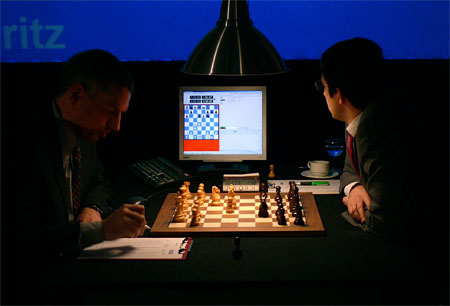http://www.fujitsu.com/global/news/pr/a ... 16-02.html
"Shogi is certainly more tactically complex than chess, but the evaluation of positions is even more difficult than in chess. It just happens that in chess material is overwhelmingly important, it takes a lot of compensation just for one pawn, and having adequate positional compensation for two pawns or the equivalent is quite rare, rare enough that a program that assumed it was impossible would probably only give up a handful of Elo points. But in shogi it is far easier to have compensation for material, and the tradeoff is very hard to judge. It is quite difficult to teach a program to make this judgement as well as a top shogi pro can make it. Just adding up a bunch of positional features the way chess programs do just won't work. If you want to say that this makes shogi a more positional game than chess, well that's a matter of definition. I would say that it's a game where proper "positional" play is relatively more important than in chess, but not necessarily more complex. A great deal of effort has already gone into making strong shogi programs, ok less than in chess but still quite a lot, and the problems haven't been fully solved, though the rate of progress is impressive. I'll predict 3 years until a program is equal to the Champ."
PS: Another question can you draw against Bonanza using this winboard GUI
http://hgm.nubati.net/WinBoard-SG.zip
http://www.4shared.com/zip/JjXmY6Ry/bonanza_v60.html
Then the main event: the International Shogi Tournament. 32 players from
27 different countries had come to Japan to fight for the honour of being
the first winner of this great event (dare we call it a World Championship?).
6 players from Asia, 13 players from Europe, 1 player from the Middle-East,
2 from North America, 3 from South America and 2 from Oceania were divided
into eight groups of four players. The winners and the runners-up of each
group would qualify for the knock-out tournament. For me the winner was
clear: the Japanese Shibu Meijin Hayashi Takahiro is a top class Japanese
amateur player, who reached the final of the amateur Ryu-O last year. When
I met him there, he turned out to be very talkative and relaxed. Even his
English is pretty good, which made him the perfect representative in this
tournament. The question was: who would he meet in the final? Larry Kaufman
was a likely candidate, as was George Fernandez. And how about the two
Chinese Zao and Shu, who were said to be very strong? Or maybe the
"Brazilian" Aoki Mikio, who was presented as 6-dan in the Forum booklet?
European hopes were European Champion Boris Mirnik from Germany and Eric
Cheymol from France.
This is how the groups were divided:
Group A:
++++++++
Cho Ul Cha Korea
Kisliuk Lev Ulianovich Russia
Larry Kaufman USA
Matt Casters Belgium
Group B:
++++++++
Boris Mirnik Germany
Ashigaki Kaoru Japan
Virginia Gonzaga Suzuki Philipines
Marco Durante Italy
Group C:
++++++++
Tanada Mayumi Japan
Robert Miller New Zealand
Fernando Batista Portugal
Shu Jen Don China
Group D:
++++++++
Irina Novikov Israel
Zao Guo Lon China
Alexander Martinoff Paraguay
Carl Johan Nilsson Sweden
Group E:
++++++++
Chai Mee Joon Singapore
Simon Morgan Australia
Alse Olufsen Norway
Niwa Kenji Japan
Group F:
++++++++
Hayashi Takahiro Japan
Les Blackstock England
Almira Scripcenco Moldova
George Fernandez USA
Group G:
++++++++
Eric Cheymol France
Sakurai Naohiko Argentina
Seppo Kalevi Ronkko Finland
Viktor Tyshchenko Ukrain
Group H:
++++++++
Harry Iwata Canada
Wisit Ngaolertloi Thailand
Aoki Mikio Brazil
Marc Theeuwen The Netherlands

